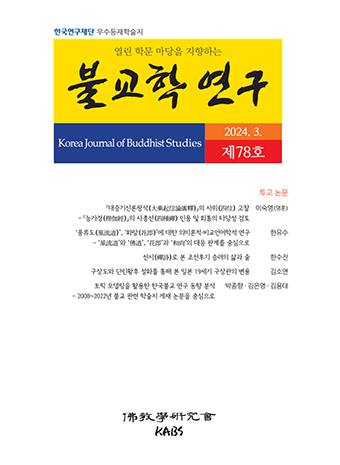Abstract
References
Sorry, not available.
Click the PDF button.
Information
One of Buddhism’s fundamental missions since early times has been to “save people in the world” while pursuing individual enlightenment. The emphasis on “saving people” was even more pronounced in Mahayana Buddhism, leading adherents to postpone their individual pursuit of salvation for the sake of “saving all the living beings in the world.” Since “saving people” addresses spiritual enlightenment as well as welfare and happiness in this world, this practice is the most distinct in terms of “engaging society.” Nevertheless, Buddhism faces challenges brought by its relatively disengaged role in social issues within Buddhist and secular society.This paper seeks to reexamine the historic and doctrinal passivity of Buddhist engagement in society while focusing on contemporary Korean Buddhism, especially the Jogye Order. Furthermore, the paper suggests a theoretical framework for developing Buddhist social engagement.
초기불교 이래 중생제도(衆生濟度)는 불교의 근본 사명 가운데 하나였으며 이러한 사명은 대승불교 전통에 와서 더욱 강조되어 심지어 “모든 중생을 다 제도할 때까지 나 자신의 깨달음을 미루겠다”고 하는 극단적인 선언으로까지 이어졌다. 중생제도가 중생들의 ‘안녕(hita)과 행복(sukha)’을 포함하여 궁극적인 구원을 의미하는 만큼 중생제도의 실천만큼 분명한 깨달음의 사회화는 없다고 할 수 있다. 그런 만큼 깨달음의 사회화는 교리적으로 내면화되어 있는 불교의 근본정신이라고 할 수 있을 것이다. 그럼에도 불구하고 ‘깨달음의 사회화’라는 점을 두고 불교는 내외로부터 지속적인 비판을 받아왔다. 전통시대 동아시아에서 불교의 ‘비사회적 성격’에 대한 유학자들의 비판은 논외로 한다하더라도 근대 이후에도 불교는 사회적 참여에 대한 소극성으로 비판을 받아왔다. 그런 한편 ‘깨달음의 사회화’라는 문제는 불교 내부의 문제제기이기도 하였다. 요컨대 불교가 출세간적 가치에 매몰되어 세간에서 벌어지고 있는 불의와 사회적 모순, 그리고 중생들의 일상적 고통을 돌보고 있지 않다는데 대한 자기반성이며 비판인 것이다.본고에서는 한국불교를 중심으로 사회참여에 대한 불교의 소극성의 연원을 교리적·역사적 측면에서 고찰하고 나아가 불교적 사회참여 이론을 정립하기 위한 몇 가지 방법론적 틀을 제안하고자 한다.
Click the PDF button.
- Publisher :Korean Association of Buddhist Studies
- Publisher(Ko) :불교학연구회
- Journal Title :Korea Journal of Buddhist Studies
- Journal Title(Ko) :불교학연구
- Volume : 24
- No :0
- Pages :7 ~ 55


 Korea Journal of Buddhist Studies
Korea Journal of Buddhist Studies






